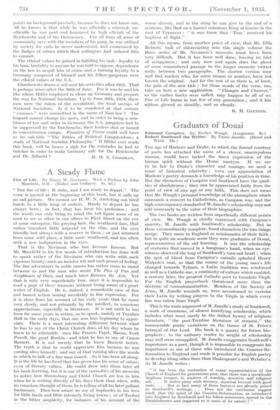A • Steady Flame
Fire of Life. By Henry W. Nevinson. With a Preface by John Masefleld, O.M. (Nisbet and Gollanez. 8s. 6d.) " THE fire of life ; It sinks, and I am ready to depart." The verse is quoted at the beginning of this book, but it calls up no sad picture. We cannot see H. W. N. stretching out tired ' hands to a little heap of embers. Ready to depart he has always been ; in fact, that has been his profession ; and the words can only bring to mind the, tall figure some of us used to see so often in our offices in Fleet Street on the eve of some enterprise, the greying hair, the weathered face, that rather truculent little imperial on the chin, and the eyes friendly but always with a reserve in them ; or just returned from some wild place, a little more weathered, and too often with a new indignation in the eyes.
That is the Nevinson who has become famous. But Mr. Masefleld in his few words of introduction has done well to speak rather of the' NevinsOn who can write with such vigorous beauty; such an incisive wit and such power of feeling. The fine adventurer in noble causes has rather conic to stand between us and the man who wrote The Plea of Pan and Neighbours of Ours, and much later Between the Acts. Yet that is only very superficially true, since it is impossible to read a page of the memoirs without being aware of a great writer of English. He is, indeed, a remarkable case of fine. and honest action issuing inevitably in fine expression. For it is clear from his account of his early years that he came;' very slowly, and not primarily by the intellect, to conscious appreciations, especially in literature. It' is not until he has been for sonic years in action, so to speak; mainly at Toynbee Hall in the early days, that one sees him beginning to appre- ciate. There is a most interesting difference between what he has to say of the Christ Church dons of his day whom he knew to be admirable—men like Francis Paget, Macan, York Powell, the great Ruskin—and what he has to say of Canon, Barnett. It is not merely that he knew Barnett better. The truth is that he could appreciate him because he was coming alive himself ; and out of that coming alive the words in which to talk of a fine man issued. So it has been all along. It is the life he has lived that has given him his sense of values, even of literary values. He could' draw into them later all his book-learning, but it is one of the curiosities of his memoirs, to notice how Shrewsbury and Christ Church are less in him when he is writing directly of his days there than when, with., no conscious thought of them, he is telling of all his later gallant' businesses. Then how aware we are of Sophocles in his love for little lands and little intensely living towns ; or of Tacitu& in the bitter simplicity, for instance, of his account of the
cocoa slavery, and in the sting he can give to the end of a sentence, like that on a forMer notorious King of Greece in the rout of Tyrnavos : ." it was there that Tino ' received his baptism of flight."
All this means, from another point of view, that Mr. Ellis. Roberts' task of abbreviating into this single volume the three series of Mr. Nevinson's memoirs melt have been very difficult. But it has been well done, leaving no hint of scrappiness ; and only now and again does the ghost of some remembered passage in the longer memoirs twitter Sadly between two paragraphs. The shorter version may well find readers, who, for some reason or another, have not known the original. And for the rest of us there is, at least, the gain of .the new title ; for those words of the verse, too, take on here a 'new application. " Changes and Chances," as the earlier books were called, may happen to all of us. Fire of Life burns in but few of any generation ; and it has seldom glowed so steadily, and so cleanly.
R. H. Gnomon.


























































 Previous page
Previous page